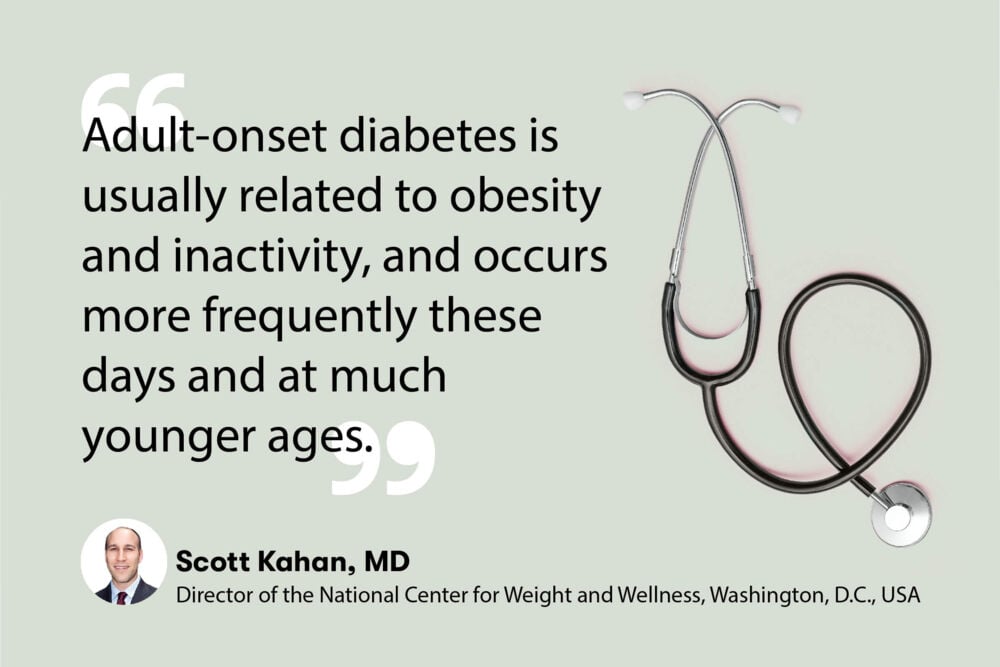In part two of his interview with Flo, Dr. Scott Kahan focuses on diabetes (which is affecting people at much younger ages these days) and other obesity-related diseases. Jump into this interview to learn how maternal obesity can impact fetal health.
-
Tracking cycle
-
Getting pregnant
-
Pregnancy
-
Help Center
-
Flo for Partners
-
Anonymous Mode
-
Flo app reviews
-
Flo Premium New
-
Secret Chats New
-
Symptom Checker New
-
Your cycle
-
Health 360°
-
Getting pregnant
-
Pregnancy
-
Being a mom
-
LGBTQ+
-
Quizzes
-
Ovulation calculator
-
hCG calculator
-
Pregnancy test calculator
-
Menstrual cycle calculator
-
Period calculator
-
Implantation calculator
-
Pregnancy weeks to months calculator
-
Pregnancy due date calculator
-
IVF and FET due date calculator
-
Due date calculator by ultrasound
-
Medical Affairs
-
Science & Research
-
Pass It On Project New
-
Privacy Portal
-
Press Center
-
Flo Accuracy
-
Careers
-
Contact Us
How Obesity Affects Health and Pregnancy: An Expert Explains


Every piece of content at Flo Health adheres to the highest editorial standards for language, style, and medical accuracy. To learn what we do to deliver the best health and lifestyle insights to you, check out our content review principles.
Interview has been edited for clarity.
Diabetes and obesity
According to Dr. Kahan, there are at least 236 diseases associated with obesity.
Perhaps the most common and well known of them is diabetes. “There has been an epidemic rise in diabetes rates over the past few decades. And this is particularly notable because it has led to a change in how we classify diabetics,” says Dr. Kahan.
Dr. Kahan notes that when he was in medical school 20 years ago, diabetes was referred to as either childhood-onset or adult-onset. Childhood-onset diabetes was diagnosed in people who developed diabetes very early and had to take insulin.

Adult-onset diabetes developed later in life, usually in the patients’ 50s, 60s, or 70s.
This has changed substantially, Dr. Kahan says. Adult-onset diabetes is usually related to obesity and inactivity, and occurs more frequently these days and at much younger ages.
“The names changed because so many children and teenagers were getting ‘adult-onset’ diabetes.
“Now we call it Type 1 diabetes, which is not related to obesity and usually happens in children. We now call ‘adult-onset’ diabetes Type 2 diabetes. It almost always occurs in people with obesity or excess weight,” explains Dr. Kahan.
In addition to occurring in older people, he says that Type 2 diabetes now frequently occurs in younger adults, adolescents, and young children.
Take a quiz
Find out what you can do with our Health Assistant
Heart disease rates are increasing again
Another notable obesity-related disease is heart disease, also known as cardiovascular disease, says Dr. Kahan.
Heart disease rates increased substantially over the first half of the 20th century. Then, in the second half, the rates came down significantly, marking an important advancement in public health. In the second half of the 20th century, the incidence of heart disease decreased because rates of smoking decreased. Health care providers also became better at identifying heart disease and treating it appropriately.
“That was a very wonderful thing, but now we are seeing a change. In the last few years, heart disease rates are increasing again. This is the first time in about 75 years that heart disease rates are going up. And the primary cause of that is the continuing increase in obesity rates,” says Dr. Kahan.
Risks of obesity during pregnancy
Dr. Kahan says that obesity during pregnancy is particularly concerning because it can transfer many health risks to the baby.
“Obesity itself is an inflammatory condition. When people gain a lot of weight, the fat cells make a lot of hormones and chemicals that cause inflammation, and those affect the developing fetus. This can cause a lot of problems,” Dr. Kahan explains.
In many ways, the fetus is already at higher health risk even before being born.
First of all, it can cause problems during labor and delivery. When babies are bigger because of maternal obesity, there can be more complications during delivery.
After that, maternal obesity can also lead to health risks for the baby as they grow up, including a higher risk for obesity and diabetes. This unhealthy cycle can perpetuate over generations.
“In many ways, the fetus is already at higher health risk even before being born,” Dr. Kahan says.
Physical activity during pregnancy to prevent obesity
There are many important health considerations and preventive steps for people who are planning to become pregnant, Dr. Kahan says.
“In addition to taking vitamins and other important steps, it’s important to address eating patterns and physical activity to try to manage weight. Each of those lifestyle changes during pregnancy is related but also important on its own.
“Nutrition during pregnancy is crucial. Even small steps go a long way in terms of the quality of food that we eat.”
Dr. Kahan also mentions that physical activity is very important during pregnancy. “There has been a change in recommendations over the past few years. In the past, pregnant people may have been discouraged from continuing their exercise and being active during pregnancy.
“Now it’s very clear that continuing physical activity throughout pregnancy is very important for both the health of the pregnant person and the health of the developing fetus.”


Hey, I'm Anique
I started using Flo app to track my period and ovulation because we wanted to have a baby.


The Flo app helped me learn about my body and spot ovulation signs during our conception journey.


I vividly
remember the day
that we switched
Flo into
Pregnancy Mode — it was
such a special
moment.
Real stories, real results
Learn how the Flo app became an amazing cheerleader for us on our conception journey.




